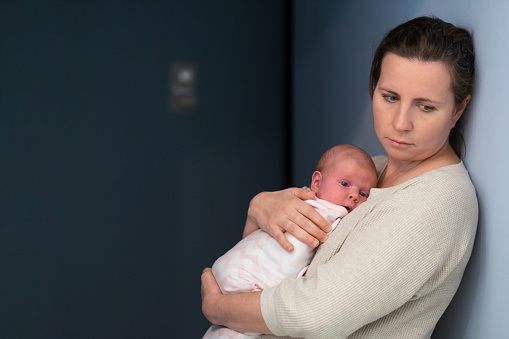‘Baby Blues’ or Depression? How You Can Help
It’s not just young women who suffer ‘baby blues’ after giving birth, but a study has revealed a surprisingly high number of them have more serious depressive symptoms.

Between 1991 and 2021 there has been a clear trend of mothers having children later in life in the United Kingdom so this is not just an issue for young women.
The number of women aged 45 and over giving birth is at the highest level since records began 80 years ago.
It is estimated that 1 in 8 women may suffer post partum depression and this usually occurs during the 6 weeks after giving birth.
Symptoms can include constant sadness, lack of energy and difficulty bonding with the baby
For most the symptoms are mild and short-lived; however, 10 to 15% of women develop more significant symptoms of depression or anxiety.
The hormone connection
Progesterone is a natural mood enhancer and during pregnancy a woman produces huge amounts to support the baby.
However the levels totally plummet immediately after giving birth and this can lead to the ‘baby blues’ or in more serious case a deep depression.
It was thought that such depression was rare, but in a large-scale study seems to be more common than was believed. The study was a massive undertaking which included a depression screening of 10,000 women who had recently given birth at Northwestern Memorial hospital in the USA and revealed a large percentage of women who suffered recurrent episodes of major depression.
“In the U.S., the vast majority of postpartum women with depression are not identified or treated even though they are at higher risk for psychiatric disorders,” said lead study author Katherine L. Wisner, M.D of Northeastern.
“It’s a huge public health problem. A woman’s mental health has a profound effect on fetal development as well as her child’s physical and emotional development.”
Suicide accounts for a staggering 20 percent of postpartum deaths and is the second most common cause of mortality in postpartum women. Many women who screened positive for major depression postpartum had already experienced at least one episode of depression previously and, in addition, had an anxiety disorder.
Of the women who screened positive for major depression, 22 percent had bipolar disorder, the majority of whom had not been diagnosed by their physicians. It is a little known fact that postpartum is the highest risk period for new episodes of mania in a woman’s life.
That’s a very high rate of bipolar disorder that has never been reported in a population screened for postpartum depression before and it is highly significant because antidepressant drug treatment alone can worsen the course of bipolar disorder.
“A lot of women do not understand what is happening to them,” Wisner said. “They think they’re just stressed or they believe it is how having a baby is supposed to feel.” It seems that women who have been pregnant in the past year are less likely to seek treatment for depression than women who have not been pregnant, as previous research has shown.
What can be done?
Women most at risk were those with some previous history of depression, but this was often not picked up in prenatal screening.
There is a very simple step women can take to ensure they minimise their risk of depression or the baby blues and that is to restore their progesterone levels as soon after giving birth as possible.
One of the many beneficial effects of progesterone is in supporting and maintaining elevated mood, and the natural way to do this is by supplementing with bioidentical natural progesterone so they do not have to plunge into the depression after giving birth.
Using a quarter teaspoon twice daily can help bring up the progesterone levels and cope with the mood swings often experienced and that many mothers assume is just what happens – it isn’t and something can be done about it.
Helpful information
In many cultures throughout the world, there has been a historical time of 40 days after giving birth when the new mother is expected to relax and be supported by friends and family.
Unfortunately today this is not always possible, but it is important that a new mother is given as much help as is needed by health professionals, and also by friends and family.
Some of the ways to help can be really simple, such as offering help with household tasks, shopping and making sure the new mother gets as much rest and relaxation as possible.
Certainly progesterone will be extremely helpful in restoring the plunging hormone levels and helping with its natural mood enhancing qualities to improve mood. But it can be very helpful to speak to your doctor, or a therapist if this becomes more serious.
It can also be helpful to make sure that your diet is giving as much assistance as possible in helping you recover. If you are not sure, then the following article can give you some clues on what it’s best to avoid.
https://anna.blog.wellsprings-health.com/foods-to-avoid-if-you-have-anxiety-or-depression/


















